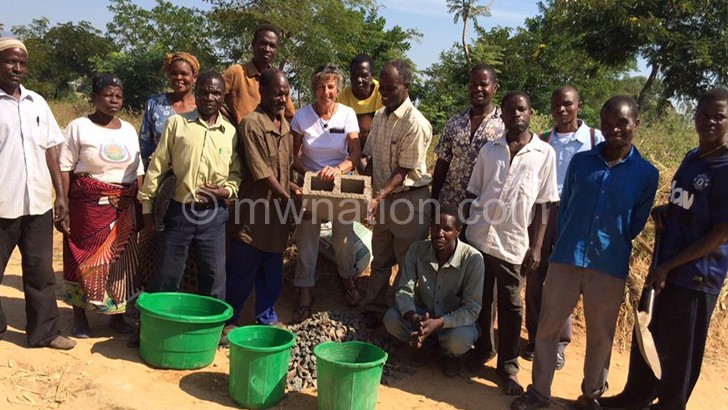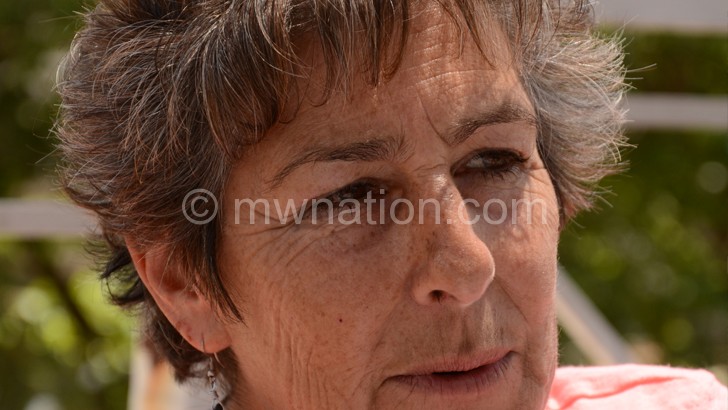RUTHIE MARKUS: PURSUING LATE SON’S DREAM
Not allowing the death of her only child Alex, a medical doctor, put her down; in the memory of her son, Briton Ruthie Markus decided to establish a trust that would accomplish works that Alex would have done if he were alive. Today, Alex’s Medical Clinic in Africa (Ameca) Trust has achieved a number of notable successes and MERCY MALIKWA spoke to Markus on the trust’s achievements and what drives her passion for the rural healthcare in Malawi.
Who is this Ruthie Markus who has fallen in so much love with Malawians?
I was born in 1956, in London, UK. My parents died several years ago. I was one of five children, but sadly my brother died two years ago. I have three remaining siblings who all live outside of the UK.
What is your education background?
I was educated in north London and have a BSc (Hons) degree in human biology and health from university, graduating in 1979. I am also a qualified teacher. Before I founded Ameca, I taught biology, chemistry and mathematics to high school students. I also worked in special education for some years.
What motivated and inspired you to establish Ameca?
I founded the Ameca Trust in December 2006 in memory of my only child, Lt. Alex Coutselos, who studied medicine at Nottingham University on an Army scholarship. Alex was a newly qualified British Army doctor and an officer in the Royal Army Medical Corps who had been awarded his paratrooper wings. He died on October 15 2006, aged 23.
The inspiration for the charity was my son’s passionate interest in medicine in African countries, especially in challenging rural settings. What drives me is the need, as Alex’s mother, to carry out some of the initiatives in which he would have become involved, had he lived.

What kind of work is Ameca doing in Malawi?
In May 2011, the charity completed the building of the Ameca Wing—a two-storey private day surgical wing at the Beit Cure International Hospital in Blantyre.
Income from this facility helps to support free paediatric orthopaedic care at Cure together with The Club Foot Programme which is now being taken to outreach clinics all over Malawi. To date, over K52 million has been generated from the day surgical wing and the Ameca coffee bar.
It sounds a long story
Earlier, in 2011, Ameca drove two ambulances from the UK to Malawi and donated them to Beit Cure Hospital. We regularly transport medical and surgical equipment and supplies for district hospitals, including diathermy machines and computers. We will soon donate two anaesthetic machines to a government community hospital in Ndirande and to a mission hospital in Bangula in a joint initiative with the Dutch surgical charity.
(http://www.malawikom.org/en/index.html)
What other support does Ameca offer?
Led by Ameca’s clinical director and consultant surgeon Paul Thomas, Ameca also arranges for UK surgeons to assist in training clinical officers in surgery in district hospitals. The lack of trained surgeons and clinical officers in many district hospitals presents a serious challenge for rural communities.
This initiative has been undertaken in collaboration with COST Africa [Clinical Officer Surgical Training] programme coordinated by College of Medicine.
Ameca has donated approximately K55.5 million in bursary awards to UK students of medicine, physiotherapy and nursing for electives in sub-Saharan African countries. The Ameca website hosts a free medical database of African hospitals to assist students with research into elective placements: http://ameca.org.uk/alumni
What project is Ameca currently involved in?
Ameca is fundraising to build a primary healthcare clinic at Chilaweni, in South Lunzu, Blantyre to deliver healthcare to local communities. The charity will build and fully equip the clinic, provide staff housing and an ambulance.
A memorandum of understanding (MoU) has been signed with the Department of Health in Lilongwe, the Blantyre District Health Office (DHO) and, on completion; the clinic will be handed over to Blantyre DHO.
This facility will serve around 22 000 people in 11 villages, who are currently without access to healthcare within reach of the locality.
Where do you get the funds to support the promotion of health in Malawi?
We are incorporated in Malawi and in the UK. In Malawi, we received funding from the 360 Mulanje Bike Ride in 2013, through the fantastic efforts of Blantyre Round Table 20. We have also received some funding from the proceeds of Tea Association of Malawi (TAM) tea auction. We have also received a donation of the cost of one staff house from S R Nicholas and are deeply grateful for their continued support and generosity.
Business studies students at Saint Andrew’s International High School in Blantyre are raising funds via their courses. We are also lucky to have the support of Skyband, who have done so much to help us.
Most of the charity’s funding is raised in the UK, through sponsored events and student fundraising challenges which are undertaken at Chilaweni with support from the staff of Joshua Orphan and Community Care, (joshuainmalawi.org.uk). The generosity of spirit of people supporting Ameca is legend.
What challenges do you face in Malawi?
Malawi has always been a safe and welcoming country, whose people are delightfully warm and friendly.
There are, of course, challenging days, especially at the moment due to the frequent power outages which compromise the ability to work effectively, use the computer or the Internet. It is also sometimes difficult to get clear lines of communication from some administrative offices, but for the most part, it is a question of perseverance.
What is your vision for Malawi?
This is a tough question. I, honestly, do not feel that it is my place as a foreigner in another country to state what Malawi should or should not become or should or should not do. My vision for Malawi is the same as my vision for my own country; namely that communities can access good education and healthcare for their children and that young people can afford post school training and have a chance to obtain employment. Ameca’s long-term objectives include aspirations to sponsor training for surgeons, doctors and clinical officers.
How do you manage your time?
One of the biggest challenges is having a limited amount of time on the ground in Malawi to get things done. Broadly speaking, it is an attitude of mind, but I have to be immensely organised and accept the nomadic nature of my life. Yes, friendships can suffer, but true friendships will always endure.
What makes you happy with what you do?
When I am able to appreciate that Ameca is able to make a difference to the quality of someone’s life or even potentially, to the life of a whole community. Ameca prides itself on minimising administrative costs; we have no staff and work from our homes to keep costs down.
What else do you like doing?
When I am lucky to have a weekend off, I love to visit Liwonde National Park and spend a time with wildlife in total peace and quiet—no phones, no computers and nothing except good company. This is an incredibly beautiful country, especially up North where deforestation has not yet taken its toll. I also enjoy practising my Chichewa.
Your last words Ruthie?
I hope that I can one day look back and feel that Ameca has made a positive contribution, especially to healthcare in rural environments. n






